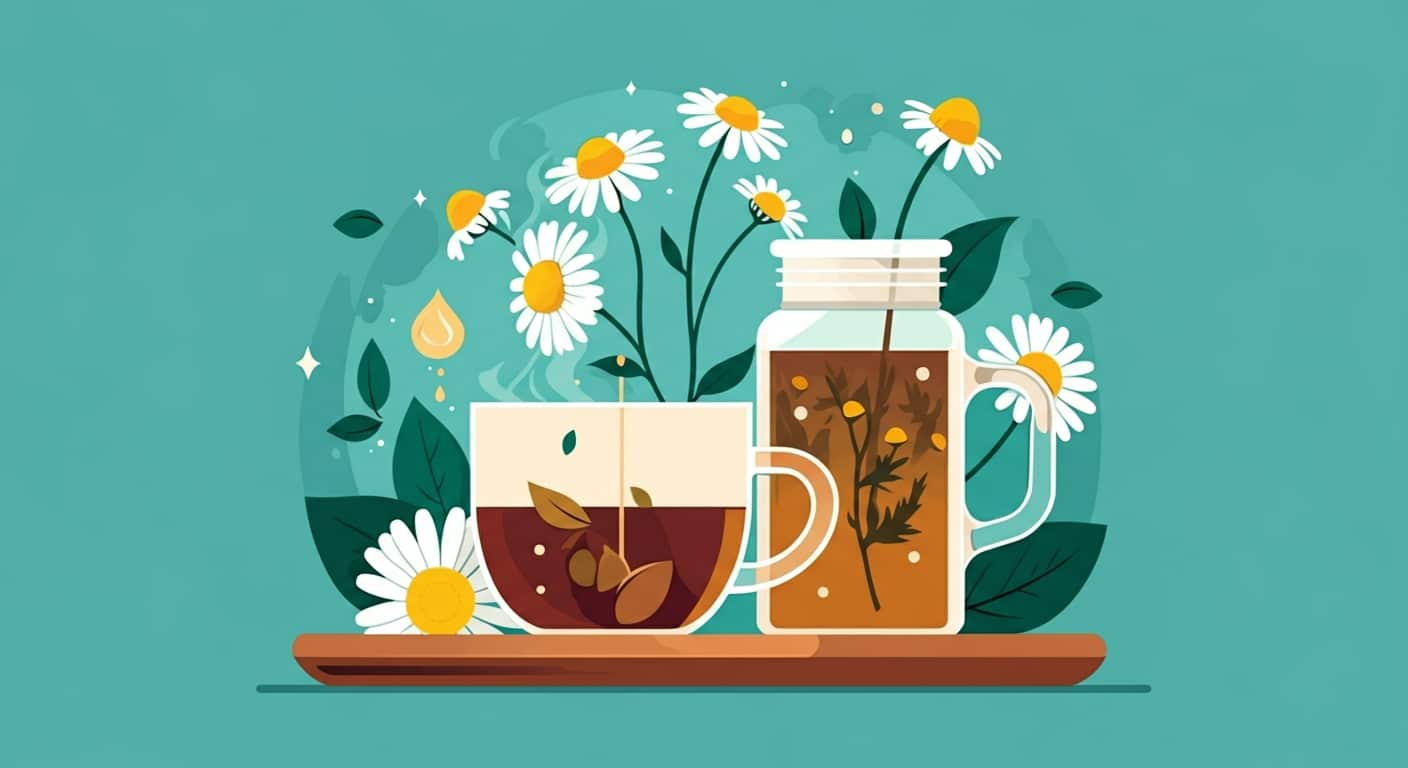
Does Chamomile Tea Contain Caffeine?
Short answer: No—pure chamomile tea doesn’t contain caffeine. Chamomile is an herbal tea (tisane) made from chamomile flowers, not from the Camellia sinensis plant (the source of green and black tea). It’s naturally caffeine free unless it’s part of a tea blend with caffeinated leaves.
Key points
- Pure chamomile = 0 mg caffeine per 8 oz cup
- Blends with green tea or black tea do contain caffeine
- “Decaf” isn’t required—chamomile is naturally caffeine-free
- Check the ingredient list for “chamomile flowers” only (single-ingredient)
People also ask: do chamomile tea contain caffeine? Answer: no—unless mixed with caffeinated tea blends or there’s café cross-contamination.
What “Herbal Tea” Means
Chamomile is an herbal infusion (tisane): hot water poured over the dried flower heads of Matricaria chamomilla (German chamomile) or Chamaemelum nobile (Roman chamomile). Because it isn’t from the Camellia sinensis leaf, it doesn’t add to your caffeine intake. If you see camomile tea, that’s just an alternate spelling.
Is Chamomile Tea Caffeine-Free?
|
Beverage |
Typical caffeine (per 8 oz) |
|---|---|
|
Chamomile tea (pure herbal tea) |
0 mg |
|
Green tea |
30-50 mg |
|
Black tea |
40-70 mg |
|
Takeaway: Choosing chamomile helps reduce caffeine consumption, which can support sleep quality and evening routines. |
Chamomile Tea vs Green Tea (Caffeine)
Green tea (true tea from the Camellia sinensis plant) usually has 30–50 mg of caffeine per cup. Chamomile tea—a caffeine free herbal tea—has 0 mg. Swapping an afternoon green tea for chamomile is an easy way to cut caffeine without losing a warm, comforting calming cup.
Why Chamomile Is Naturally Caffeine Free
Caffeine occurs naturally in true tea leaves and certain plants (e.g., coffee, yerba mate). Chamomile is brewed from flower heads, not tea leaves, so it’s naturally caffeine free—no chemical “decaf” step needed. Look for labels that list only “chamomile flowers.”
Does Camomile Tea Have Caffeine? (Alternate Spelling)
You’ll sometimes see camomile on packaging. It’s the same plant. Pure camomile/chamomile is caffeine free; caffeine shows up only when it’s blended with green or black tea, or when cafés use shared pots that can leave residues.
When Chamomile Can Have Caffeine
- Blends: “Chamomile + Green/Black/White Tea” contains caffeine.
- “Energy” blends: Watch for yerba mate, guayusa, or added “natural caffeine.”
- Cafés: Shared kettles/teapots can cause cross-contamination—ask for a fresh pot.
- Label checklist (caffeine free goal): Ingredients should read chamomile flowers only; avoid caffeinated tea blends.
Benefits & Best Times to Drink
Many people reach for a caffeine free cup of chamomile to unwind—especially at night. While responses vary, chamomile is commonly used to:
- Support relaxation and bedtime routines (may help with perceived sleep quality and staying asleep)
- Offer a warm herbal medicine alternative to caffeinated beverages
- Soothe the digestive tract for mild, occasional discomfort
The flavor is mellow and floral with subtle apple/pear notes. Because it’s caffeine free, it won’t add stimulant effects that can disrupt sleep.
“Anti-Inflammatory” Context & Benefits of Chamomile Tea
Chamomile contains plant compounds (including apigenin) discussed in research for anti inflammatory and calming properties. That doesn’t make tea a treatment, but it explains why some people include chamomile in a daily routine for a gentle, generally safe calming cup. Keep broader benefits of chamomile tea on a separate pillar to avoid intent drift here.
Safety Notes: Blood Pressure & Blood Sugar (Educational)
- Allergy caution: People allergic to the Asteraceae (daisy) family (e.g., ragweed, chrysanthemums) may be more likely to have an allergic reaction (itchiness, sneezing, runny nose).
- Medications: Use care with sedatives or blood thinners; consult a clinician.
- Pregnancy/lactation: Safety isn’t established; seek professional guidance.
- Conditions: If you manage blood pressure or blood sugar, discuss routine changes with your clinician.
- Children: Follow professional advice.
Educational content only. Not medical advice.
Chamomile Tea vs. Chamomile Supplements
Prefer to drink chamomile tea, or take chamomile supplements? Tea delivers aroma, hydration, and 0 mg caffeine. Extracts/glycerites are more concentrated; always follow product directions and professional guidance—especially if you’re pregnant, nursing, or on blood thinners/sedatives.
How to Drink Chamomile Tea
- Use 1–2 g dried flowers (or one chamomile tea bag) per 8 oz hot water.
- Cover and steep 5–10 minutes, then strain.
- Enjoy plain or with lemon. Because it’s caffeine free, evening is a popular time.
FAQs
Does chamomile tea contain caffeine?
No—pure chamomile is an herbal tea and naturally caffeine free.
Can chamomile tea have caffeine?
Yes—if it’s blended with green tea or black tea, or brewed on shared café equipment.
Is there caffeine in chamomile tea?
Not in single-ingredient products labeled “chamomile flowers.”
Does chamomile make you sleepy?
Many people find it soothing and helpful in a bedtime ritual; effects vary.
“Camel tea” vs. chamomile tea—are they the same?
“Camel tea” is a typo/mishearing. Chamomile is the caffeine-free herbal infusion from daisy-family flowers.
Can chamomile tea lower blood pressure or blood sugar?
Chamomile isn’t a treatment. If you track blood pressure or blood sugar, consult your clinician.
Masterful Display
Each and everyone of our products are deeply considered, labored over, and improved upon time and time again. We invite you to experience the difference of our carefully crafted small batches of herbal support items. Whether it be our tea line, produced for a delightful experience, or our tincture blends and extracts, we have what you need.

